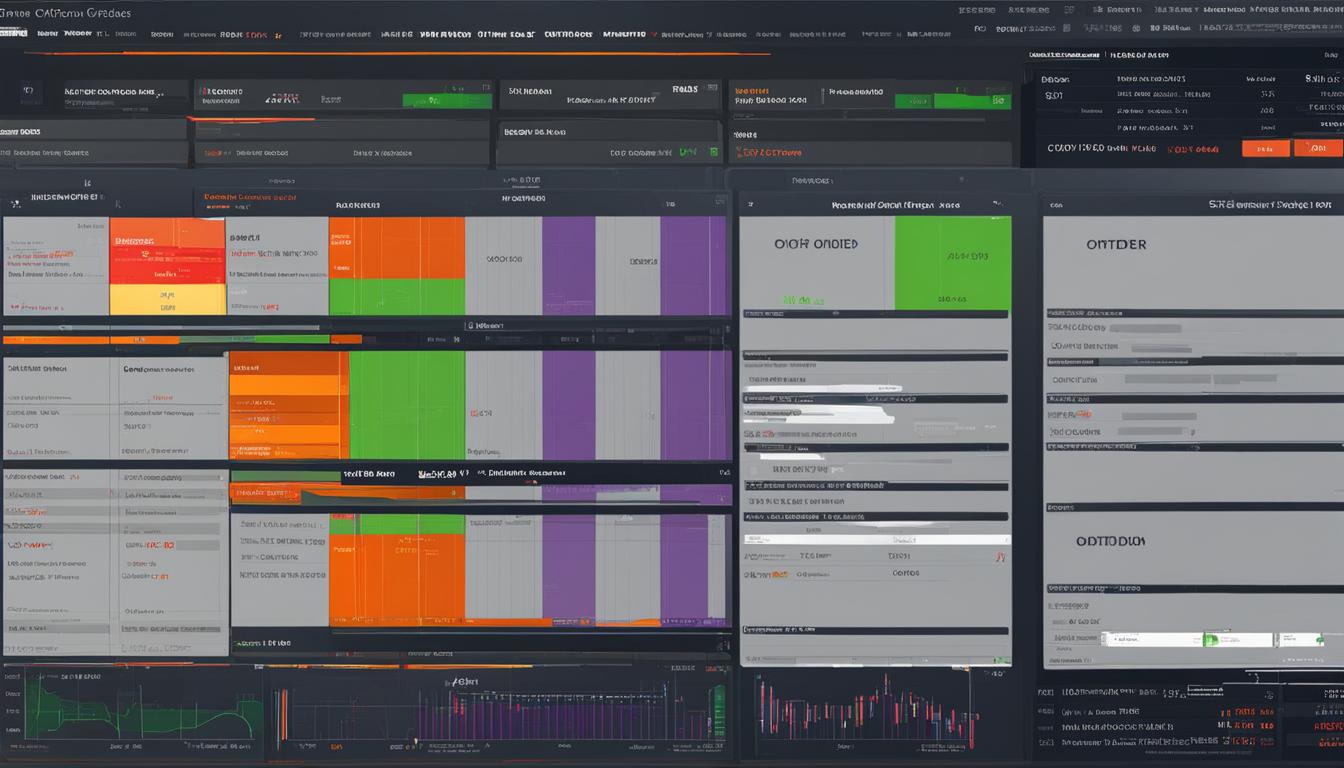Options Exchanges: Who They Are And How They Operate
An options exchange is a vital component of the financial markets, providing a platform for investors to trade standardized options contracts. These contracts allow individuals to buy or sell a specific quantity of a financial product at a predetermined price. Options exchanges, also known as options trading platforms or options marketplaces, facilitate these transactions by ensuring the contracts are traded on an exchange, settled through a clearinghouse, and guaranteed.
Notable options exchanges, such as the Cboe Options Exchange, operate under the supervision of regulatory bodies like the Securities and Exchange Commission (SEC) and the Commodity Futures Trading Commission (CFTC). By offering exchange-traded options, these platforms provide benefits such as improved liquidity, reduced costs, and the reliability of clearinghouses guaranteeing the fulfillment of obligations.
Key Takeaways:
- Options exchanges facilitate the trading of standardized options contracts.
- These platforms allow investors to buy or sell a specific quantity of a financial product at a predetermined price.
- The Cboe Options Exchange is a notable example of an options exchange.
- Exchange-traded options offer benefits such as improved liquidity and reduced costs.
- Clearinghouses play a crucial role in guaranteeing the fulfillment of obligations in options trading.
Key Features of Exchange-Traded Options
Exchange-traded options offer several key features that make them an attractive choice for traders. These options are standardized contracts listed on exchanges, such as the Cboe Options Exchange. Unlike over-the-counter options, exchange-traded options have predetermined strike prices, expiration dates, and quantities of the underlying asset. They are overseen by regulatory bodies and guaranteed by clearinghouses, such as the Options Clearing Corporation.
The standardization of exchange-traded options brings several advantages. Firstly, it allows for improved liquidity, meaning there is a higher volume of options available for trading. This increased liquidity makes it easier for traders to buy and sell options and can result in narrower bid-ask spreads. Additionally, exchange-traded options benefit from reduced costs for traders. The standardized nature of these contracts streamlines the trading process, making it more efficient and cost-effective.
Another significant advantage of exchange-traded options is the role of clearinghouses in guaranteeing the fulfillment of obligations. Clearinghouses act as intermediaries, ensuring that both buyers and sellers of options meet their contractual obligations. This mitigates counterparty risk and provides traders with confidence that their trades will be executed as intended. The involvement of clearinghouses also contributes to the overall stability and integrity of the options market.
Key Features of Exchange-Traded Options Summary:
- Exchange-traded options are standardized contracts listed on exchanges.
- They have predetermined strike prices, expiration dates, and quantities of the underlying asset.
- Regulatory bodies oversee exchange-traded options, and clearinghouses guarantee their fulfillment.
- The standardization of exchange-traded options improves liquidity and reduces costs for traders.
- Clearinghouses play a crucial role in ensuring the fulfillment of obligations, mitigating counterparty risk.
| Advantages of Exchange-Traded Options | Disadvantages of Exchange-Traded Options |
|---|---|
| Improved liquidity | Lack of customization |
| Reduced costs for traders | |
| Guaranteed fulfillment of obligations |
Benefits of Exchange-Traded Options
Exchange-traded options, also known as listed options, offer numerous benefits compared to over-the-counter options. The standardized nature of these options, including strike prices, expiration dates, and deliverables, attracts a larger number of traders, leading to improved liquidity and narrower bid-ask spreads. Additionally, clearinghouses can guarantee the exercise of options and fulfillment of obligations since the contracts are interchangeable. This mitigates risk and makes exchange-traded options appealing to investors.
One of the key advantages of exchange-traded options is the improved liquidity they offer. With a larger pool of traders participating in these markets, it becomes easier to buy or sell options at fair prices. This increased liquidity enhances market efficiency and reduces the risk of price manipulation, making exchange-traded options a reliable choice for investors.
Another benefit is the reduced costs associated with exchange-traded options. Due to the standardized nature of these contracts, the trading process is streamlined, resulting in lower transaction costs. Additionally, the presence of clearinghouses that guarantee the fulfillment of obligations adds a layer of safety and transparency, eliminating the need for individual counterparty risk assessments.
Improved liquidity
Exchange-traded options attract a larger number of traders, leading to increased liquidity in the market. This liquidity is essential for efficient price discovery and ensures that investors can easily enter or exit positions without significant price impact. The availability of buyers and sellers improves the overall trading experience and can lead to narrower bid-ask spreads, reducing transaction costs for traders.
Reduced costs
The standardized nature of exchange-traded options results in lower transaction costs compared to over-the-counter options. These standardized contracts make it easier for market participants to match orders, reducing the need for negotiation and manual price discovery. Additionally, clearinghouses provide a centralized mechanism for clearing and settlement, further reducing costs and increasing efficiency.
Overall, exchange-traded options offer improved liquidity, reduced costs, and enhanced risk management capabilities due to their standardized nature and the presence of clearinghouses. These advantages make them a popular choice among investors looking to participate in options trading.
| Benefits of Exchange-Traded Options |
|---|
| Improved liquidity |
| Reduced costs |
Drawbacks of Exchange-Traded Options
While exchange-traded options offer numerous benefits, there are some drawbacks to consider. One significant disadvantage is that these options are standardized, which means they lack the flexibility for customization that over-the-counter options provide. Unlike OTC options that can be tailored to meet specific requirements, exchange-traded options have predetermined strike prices, expiration dates, and deliverables.
Although the standardized nature of exchange-traded options limits customization, it’s important to note that most trading needs can still be met. This is due to the wide variety of strike prices and expiration dates typically offered by options exchanges. Traders have a range of options to choose from, allowing them to find contracts that align closely with their investment goals.
In summary, while the lack of customization is a drawback of exchange-traded options compared to OTC options, the availability of a diverse range of contracts can address the needs of many traders. The standardized nature of these options also provides benefits such as improved liquidity and reduced costs.
Drawbacks of Exchange-Traded Options
- Lack of customization compared to over-the-counter options
- Standardized strike prices, expiration dates, and deliverables
“The lack of customization in exchange-traded options may restrict traders who have specific requirements. However, the wide variety of strike prices and expiration dates offered by options exchanges can still cater to a broad range of trading needs.” – Industry Expert
| Drawbacks of Exchange-Traded Options | |
|---|---|
| Limited customization | Standardized strike prices, expiration dates, and deliverables |
The CBOE Options Exchange: A Leader in Options Trading
The CBOE Options Exchange, formerly known as the Chicago Board Options Exchange (CBOE), has established itself as the world’s largest options exchange since its founding in 1973. This exchange provides a diverse range of options contracts for individual equities, stock indexes, and interest rates, catering to a wide spectrum of trading needs. One notable product offered by the CBOE Options Exchange is the CBOE Volatility Index (VIX), a widely recognized indicator of market volatility.
Operating multiple asset classes including options, futures, equities, exchange-traded products, and foreign exchange, the CBOE Options Exchange remains at the forefront of options trading. It is known for its ability to provide improved liquidity, reduced costs, and educational resources through The Options Institute. Traders can take advantage of the exchange’s comprehensive offerings to effectively manage risk and capitalize on market opportunities.
To further illustrate the CBOE Options Exchange’s dominance in the industry, the exchange consistently achieves significant trading volumes. In Q1 2022, the exchange witnessed a record-breaking 830.3 million options contracts traded. Moreover, it reached a new all-time high of 13.4 million contracts traded per day in terms of quarterly average daily volume (ADV). These impressive figures underscore the popularity and liquidity of options trading on the CBOE Options Exchange.
Table: Comparison of Options Exchanges
| Options Exchange | Trading Volume | Product Variety | Special Features |
|---|---|---|---|
| CBOE Options Exchange | Record-breaking 830.3 million contracts traded in Q1 2022 | Wide range of options contracts, including individual equities, stock indexes, and interest rates | Home to the CBOE Volatility Index (VIX) |
| Other Options Exchanges | Varying trading volumes | Diverse product offerings depending on the exchange | Unique features specific to each exchange |
When it comes to options trading, the CBOE Options Exchange stands out as a leader, offering a comprehensive platform with a wide range of products and significant trading volume. Traders can benefit from the exchange’s established reputation, educational resources, and the ability to capitalize on market volatility through the CBOE Volatility Index (VIX). With its commitment to ensuring improved liquidity and reduced costs, the CBOE Options Exchange remains a top choice for options traders worldwide.
Products Offered by the CBOE Options Exchange
The CBOE Options Exchange, as the largest options exchange in the world, provides traders with a diverse selection of products to meet their trading needs. From options contracts on publicly traded stocks to specialized indexes, the exchange offers a wide range of options to choose from.
Options Contracts
At the CBOE Options Exchange, traders can access put and call options on publicly traded stocks, providing them with the opportunity to profit from price movements in these equities. This allows traders to implement various strategies based on their market outlook and risk tolerance.
Stock Indexes
In addition to individual stock options, the CBOE Options Exchange offers options on popular stock indexes such as the S&P 500, Dow Jones Industrial Average, and Nasdaq Indexes. These index options provide traders with exposure to broad market movements, allowing them to hedge their portfolios or speculate on market trends.
VIX Volatility Index
One of the standout offerings of the CBOE Options Exchange is the VIX volatility index, which measures market volatility expectations. Based on options prices, the VIX provides valuable insights into market sentiment and allows traders to assess the level of risk in the market. Traders can use VIX options to express their views on market volatility or to protect their portfolios during periods of heightened uncertainty.
| Products | Description |
|---|---|
| Options Contracts on Stocks | Put and call options on publicly traded stocks |
| Options on Stock Indexes | Options on popular stock indexes like the S&P 500, Dow Jones Industrial Average, and Nasdaq Indexes |
| VIX Volatility Index Options | Options based on the VIX volatility index, reflecting market volatility expectations |
The CBOE Options Exchange offers a comprehensive selection of products, enabling traders to diversify their portfolios and take advantage of various market opportunities. Whether it’s trading individual stocks, tracking market indexes, or gauging market volatility, the exchange provides a range of options to suit different trading strategies and objectives.
CBOE Options Exchange: High Trading Volume and Market Liquidity
The CBOE Options Exchange, as the largest options exchange in the world, exhibits a remarkable trading volume, attesting to the popularity and liquidity of options trading on this platform. In Q1 2022 alone, the exchange recorded a record-breaking 830.3 million options contracts traded. Furthermore, the quarterly average daily volume (ADV) reached an all-time high of 13.4 million contracts traded per day. These impressive figures highlight the active participation of traders and the robustness of the options market on the CBOE Options Exchange.
The high trading volume on the CBOE Options Exchange can be attributed to several factors. Firstly, the exchange’s wide range of options contracts, including those on individual equities, indexes, and interest rates, attract a diverse pool of traders with varying investment preferences. Secondly, the exchange’s longstanding reputation and regulatory oversight instill confidence in market participants, further driving trading activity. Lastly, the exchange’s efficient clearinghouse system allows for seamless trade execution and ensures the fulfillment of obligations, mitigating counterparty risks.
The substantial trading volume on the CBOE Options Exchange translates to enhanced market liquidity and narrower bid-ask spreads. With higher liquidity, traders can easily enter and exit positions, ensuring efficient price discovery and minimizing transaction costs. The availability of competitive bid and ask prices fosters a vibrant marketplace, benefiting both retail and institutional investors. Overall, the CBOE Options Exchange’s robust trading volume contributes to a dynamic and accessible options market for traders seeking diverse investment opportunities.
Benefits of High Trading Volume on the CBOE Options Exchange
- Improved market liquidity and narrower bid-ask spreads
- Efficient price discovery for accurate valuation of options
- Increased trading opportunities with a diverse pool of market participants
- Enhanced flexibility in executing options strategies
By capitalizing on the high trading volume and market liquidity of the CBOE Options Exchange, traders can benefit from seamless trade execution, reduced costs, and ample opportunities to capitalize on market movements.
| Trading Volume Statistics | Quarterly Data | Annual Data |
|---|---|---|
| Q1 2022 Total Options Contracts Traded | 830.3 million | – |
| Quarterly Average Daily Volume (ADV) | 13.4 million contracts | – |
| Yearly Total Options Contracts Traded | – | – |
“The CBOE Options Exchange’s high trading volume reflects the market’s confidence in the platform and its ability to deliver efficient and liquid options trading opportunities.” – Industry Expert
Overview of the Cboe Options Exchange
The Cboe Options Exchange is the largest options exchange in the United States, offering a diverse range of trading options for customers. As one of the four U.S.-listed cash equity options markets operated by Cboe, it provides a robust platform for investors to participate in options trading. The exchange utilizes a hybrid and classic model, combining open outcry and electronic exchange methods, ensuring efficient and reliable execution of trades.
At the Cboe Options Exchange, traders can access a wide variety of options contracts on publicly traded stocks, exchange-traded funds (ETFs), and exchange-traded notes (ETNs). The exchange also offers options on stock and sector indexes such as S&P 500, Dow Jones Industrial Average, and Nasdaq Indexes. Traders can take advantage of the diverse product offerings to tailor their strategies and meet their specific trading objectives.
In addition to its product range, the Cboe Options Exchange distinguishes itself through its commitment to providing valuable resources for traders. The exchange offers quick links to essential information, including fee schedules, rule books, and market volume data. Traders can also access market data services to stay informed about the latest news and trends in options trading. The Cboe Options Exchange ensures that traders have the necessary tools and information to make informed trading decisions.
Other Cboe options exchanges
Cboe operates other options exchanges in addition to the Cboe Options Exchange. These include the Cboe C2 Options Exchange, Cboe BZX Options Exchange, and Cboe EDGX Options Exchange, each with its own unique trading models and offerings. Traders who are looking for alternative options trading platforms can explore these exchanges to find the one that best suits their trading requirements.
Overall, the Cboe Options Exchange stands out as a leading player in the options trading arena, providing a wide range of options contracts, reliable trading infrastructure, and valuable resources for traders. Whether you are a seasoned trader or new to options trading, the Cboe Options Exchange offers a comprehensive platform to participate in the U.S.-listed cash equity options markets and achieve your trading goals.
Quick Links and Market Data Services
The Cboe Options Exchange offers a range of quick links to essential resources that traders can access conveniently. These quick links provide easy access to important information, including fee schedules, rule books, tech specs, notices, hours and holiday schedules, and market volume data. Traders can quickly navigate to these resources to stay informed and make well-informed trading decisions.
Additionally, the Cboe Options Exchange provides market data services that keep traders updated on the latest news and trends in the options market. These market data services provide valuable information such as the most active options, real-time quotes, historical data, and other relevant trading information. By utilizing these services, traders can stay ahead of market movements and make informed trading decisions based on up-to-date information.
Furthermore, the exchange offers strategy-based margin and portfolio margining rules, which assist traders in managing their positions effectively. These margining rules consider the risk profile and characteristics of specific options strategies, allowing traders to optimize their margin requirements and maximize capital efficiency. By utilizing these margining rules, traders can effectively manage their risk exposure and improve their overall trading performance.
Market Data Services Offered by the Cboe Options Exchange
The market data services provided by the Cboe Options Exchange include:
- Real-time options quotes
- Historical options data
- Volatility indexes, including the widely recognized VIX volatility index
- Most active options
- Options volume and open interest
- News and announcements related to options trading
Quick Links Provided by the Cboe Options Exchange
The quick links offered by the Cboe Options Exchange include:
- Fee schedules
- Rule books and regulations
- Technical specifications
- Notices and updates
- Trading hours and holiday schedules
- Market volume information
| Market Data Services | Quick Links |
|---|---|
| Real-time options quotes | Fee schedules |
| Historical options data | Rule books and regulations |
| Volatility indexes | Technical specifications |
| Most active options | Notices and updates |
| Options volume and open interest | Trading hours and holiday schedules |
| News and announcements | Market volume information |
Recent Updates and Announcements
The Cboe Options Exchange frequently provides updates and announcements to keep traders informed about the latest changes and developments. These updates serve to ensure that traders are aware of any relevant information that may impact their trading activities. It is crucial for traders to stay updated with the recent announcements from the Cboe Options Exchange to maintain a well-informed trading strategy.
Recent updates from the Cboe Options Exchange may include restrictions on trading certain options. These restrictions could be imposed to address specific market conditions or regulatory requirements. Traders should closely review these updates to understand any limitations or changes to their trading activities.
The exchange also announces the listing of new options, providing traders with expanded opportunities to trade different assets and strategies. Traders can explore these new options to diversify their portfolios and potentially capitalize on emerging market trends.
Additionally, the Cboe Options Exchange may issue reminders about testing and compliance requirements. These reminders help traders to ensure that they are in adherence to all necessary regulations and protocols. By staying compliant with these requirements, traders can mitigate risks and trade with confidence on the Cboe Options Exchange.
Recent Announcements: Key Highlights
“We are pleased to announce the listing of several new options contracts on the Cboe Options Exchange. These new listings include options on popular technology stocks, providing traders with additional opportunities to participate in the tech sector’s growth. Traders can now take advantage of the increased liquidity and trading volume in these new options contracts.”
Traders can access these announcements and updates through the Cboe Options Exchange’s website or other designated channels. By actively monitoring these updates, traders can adapt their strategies and make informed decisions to optimize their trading activities on the Cboe Options Exchange.
Conclusion
Options exchanges are vital components of the financial markets, providing standardized options contracts for investors to trade. Among these exchanges, the Cboe Options Exchange stands out as the largest and offers a diverse range of products and educational resources. Traders can benefit from improved liquidity, reduced costs, and effective risk management through exchange-traded options.
When comparing options trading platforms, it is important to consider individual trading needs and goals. By evaluating different options exchanges, traders can find the platform that best aligns with their requirements. Factors to consider may include available products, liquidity, transaction costs, and the quality of educational resources provided by the exchange.
Ultimately, finding the best options exchange involves careful research and consideration. By selecting a suitable platform, traders can enhance their trading experience and maximize their potential for success in the options market.
FAQ
What is an options exchange?
An options exchange is a standardized derivative contract that is traded on an exchange, settled through a clearinghouse, and guaranteed.
How do options exchanges work?
Options exchanges allow investors to buy or sell a specific quantity of a financial product at a predetermined price using call and put options. These contracts are overseen by regulatory bodies and guaranteed by clearinghouses.
What are the benefits of exchange-traded options?
Exchange-traded options offer improved liquidity, reduced costs, and the ability for clearinghouses to guarantee the fulfillment of obligations.
Are exchange-traded options customizable?
Exchange-traded options are standardized and cannot be tailored to fit specific requirements exactly. However, the wide variety of strike prices and expiration dates offered by options exchanges can still meet most trading needs.
What is the CBOE Options Exchange?
The CBOE Options Exchange, also known as the Chicago Board Options Exchange, is the world’s largest options exchange. It offers contracts for individual equities, indexes, and interest rates.
What products does the CBOE Options Exchange offer?
The CBOE Options Exchange offers put and call options on publicly traded stocks, ETFs, ETNs, as well as options on stock and sector indexes like the S&P 500 and Nasdaq Indexes. It is also known for the VIX volatility index.
What is the trading volume on the CBOE Options Exchange?
The CBOE Options Exchange achieved a record trading volume of 830.3 million options contracts in Q1 2022, with a new all-time high of 13.4 million contracts traded per day in terms of quarterly average daily volume (ADV).
How does the Cboe Options Exchange operate?
The Cboe Options Exchange operates as the largest options exchange in the U.S. and utilizes a hybrid and classic model, combining open outcry and electronic exchange methods. It also operates other options exchanges like Cboe C2 Options Exchange, Cboe BZX Options Exchange, and Cboe EDGX Options Exchange.
What resources are available on the Cboe Options Exchange?
The Cboe Options Exchange provides quick links to important resources, including fee schedules, rule books, tech specs, notices, hours and holidays, and market volume information. Traders can also access market data services to stay updated on the latest news and trading information.
How does the Cboe Options Exchange communicate updates to traders?
The Cboe Options Exchange frequently provides updates and announcements to inform traders of changes and developments. Traders should stay updated with the latest news from the exchange to ensure they are aware of any relevant changes to their trading activities.







